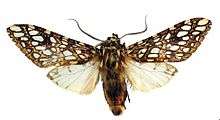Lophocampa griseidorsata
Lophocampa griseidorsata is a moth in the family Erebidae first described by Vincent and Laguerre in 2013. It is found in Bolivia (Cochabamba, La Paz), Ecuador (Napo, Morona-Santiago, Sucumbios, Azuay) and Peru (San Martin, Cuzco, Pasco).[1]
| Lophocampa griseidorsata | |
|---|---|
 | |
| Male | |
| Scientific classification | |
| Kingdom: | Animalia |
| Phylum: | Arthropoda |
| Class: | Insecta |
| Order: | Lepidoptera |
| Superfamily: | Noctuoidea |
| Family: | Erebidae |
| Subfamily: | Arctiinae |
| Genus: | Lophocampa |
| Species: | L. griseidorsata |
| Binomial name | |
| Lophocampa griseidorsata Vincent & Laguerre, 2013 | |
Description
The forewings are brown, irrorated (sprinkled) with pale and deep brown. There is one whitish spot with a yellow and two small blacks dots at the base, as well as a series of bands formed by whitish spots and organized as follows: a broken antemedial band, a slightly curved medial band with the size of the spots decreasing from the anal border to the costa and a sinuous postmedial band. The hindwings are whitish and slightly tinged with grey on the apex and along the costa. Ventrally, the marks are more contrasted, deep brown centered with yellowish brown.
Larvae
The larvae feed on several species of Urticaceae, as well as Poaceae, Fabaceae, Ericaceae, Melanostomaceae and Rubiaceae species.
Etymology
The specific epithet griseidorsata refers to the gray color of the abdominal tergites.
References
| Wikimedia Commons has media related to Lophocampa griseidorsata. |
| Wikispecies has information related to Lophocampa griseidorsata |
- Vincent, B. & Laguerre, M. (2013). "Four new Neotropical Lophocampa species with a redescription of Lophocampa atriceps (Hampson) (Lepidoptera, Erebidae, Arctiinae)". Zookeys. 264: 47-69. doi:10.3897/zookeys.264.4166
- Savela, Markku. "Lophocampa griseidorsata Vincent & Laguerre, 2013". Lepidoptera and Some Other Life Forms. Retrieved September 21, 2019.
- "Taxonomy Browser: Lophocampa griseidorsata". Barcode of Life Data System (BOLD). Retrieved September 21, 2019.